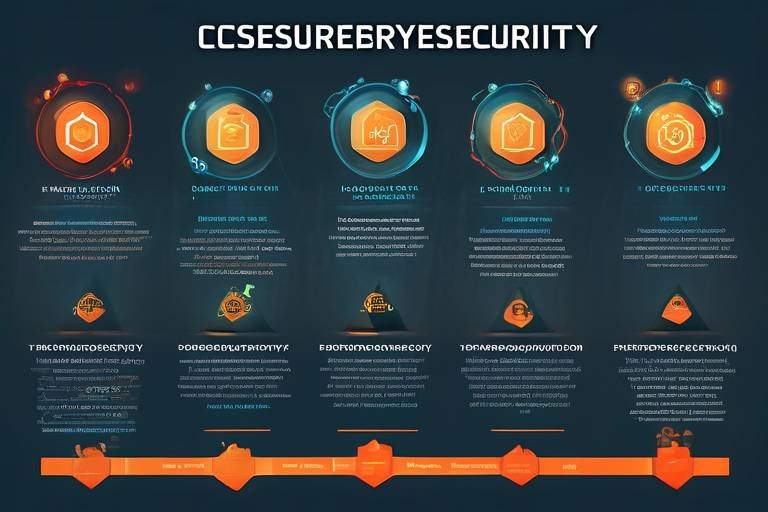Is Digital Privacy a Right or a Privilege?
The debate surrounding digital privacy is as heated as a summer day in the sun. With the rapid advancement of technology and the ever-increasing integration of the internet into our daily lives, the question arises: should digital privacy be considered an inherent right that every individual possesses, or is it merely a privilege that society can grant or revoke? This inquiry digs deep into the core of our digital existence, raising issues that impact our personal freedom, security, and even our identities.
At its essence, digital privacy encompasses the right to control one's personal information and how it is used online. Yet, the lines between right and privilege can blur, especially when we consider the varying perspectives across different cultures and legal frameworks. For instance, in some countries, privacy is embedded within the constitution, while in others, it is treated more like a luxury that can be taken away at any moment. As we navigate this complex landscape, we must ask ourselves: what does it mean to have privacy in a world where our every click and interaction can be tracked?
To further complicate matters, the role of technology companies cannot be overlooked. These giants wield significant power over our data, and their practices often dictate the terms of our privacy. Are they protectors of our information, or do they see our data as a commodity to be traded? The answer to this question plays a crucial role in determining whether digital privacy is a right or a privilege. If companies prioritize profit over protection, can we truly consider privacy a right?
Moreover, consider the implications of consumer awareness. An uninformed public is vulnerable to exploitation, making it imperative that individuals educate themselves about their digital rights. Knowledge is power, after all! When consumers understand how their data is collected and used, they can advocate for their rights and demand better protections. This leads us to an important point: if a society is not informed about its digital rights, can it claim to have them?
In summary, the question of whether digital privacy is a right or a privilege is not easily answered. It requires a multifaceted approach that considers legal, societal, and technological factors. As we move forward, we must continue to engage in this conversation, ensuring that the voices advocating for privacy are heard loud and clear. After all, in a world increasingly dominated by technology, the stakes have never been higher.
- What is digital privacy? Digital privacy refers to the protection of personal information that is shared online and the right to control who has access to it.
- Why is digital privacy important? It safeguards individuals from identity theft, unauthorized data usage, and potential exploitation, ensuring personal freedom and security.
- How can I protect my digital privacy? You can protect your digital privacy by using strong passwords, enabling two-factor authentication, being cautious about sharing personal information, and utilizing privacy-focused tools and services.
- Are there laws protecting digital privacy? Yes, various laws and regulations exist, such as the General Data Protection Regulation (GDPR) in Europe, which aim to protect individuals' privacy rights.

The Evolution of Digital Privacy
The concept of digital privacy has undergone a significant transformation over the past few decades. Initially, privacy was primarily associated with physical spaces and personal interactions. However, with the advent of the internet and the rapid evolution of technology, our understanding of what constitutes privacy has expanded dramatically. No longer is it just about keeping personal conversations confidential; it now encompasses a vast array of digital footprints we leave behind every day. From the moment we log onto social media to when we make online purchases, our data is constantly being collected, analyzed, and, at times, exploited.
To understand how we arrived at this point, we must first consider the historical context. In the early days of the internet, privacy concerns were minimal, and most users were blissfully unaware of the potential risks associated with sharing personal information online. The digital landscape was a wild frontier, where information flowed freely, and the idea of data privacy was almost nonexistent. However, as technology progressed, so did the awareness of privacy issues. High-profile data breaches and scandals revealed just how vulnerable our information could be, prompting a societal shift towards demanding greater control over personal data.
As we moved into the 21st century, the introduction of various laws and regulations began to shape the conversation around digital privacy. For instance, the European Union's General Data Protection Regulation (GDPR) established stringent guidelines on how companies must handle personal data, marking a significant turning point in the fight for digital privacy rights. This legislation not only empowered individuals by giving them more control over their data but also set a precedent for other countries to follow suit. Today, many nations are grappling with the balance between fostering innovation in technology and protecting citizens' privacy rights.
Moreover, the evolution of digital privacy is also influenced by changing societal norms. People are becoming increasingly aware of their digital rights and are advocating for stronger protections against invasive data practices. This shift in mindset is akin to a cultural awakening, where individuals are no longer willing to accept the status quo. They are demanding transparency from companies and governments alike, pushing for a future where privacy is not just an afterthought but a fundamental right.
In summary, the evolution of digital privacy is a complex narrative woven through technology, legislation, and societal change. As we continue to navigate this ever-changing landscape, it’s essential to recognize that digital privacy is not merely a privilege granted by society; rather, it is a right that must be fiercely protected. The journey is ongoing, and the stakes have never been higher.
- What is digital privacy? Digital privacy refers to the protection of personal information that is stored and shared online. It encompasses various aspects, including data collection, storage, and usage.
- Why is digital privacy important? Digital privacy is crucial because it protects individuals from identity theft, data breaches, and unauthorized surveillance. It also allows people to maintain control over their personal information.
- How can I protect my digital privacy? You can protect your digital privacy by using strong passwords, enabling two-factor authentication, being cautious about the information you share online, and utilizing privacy-focused tools and services.

Legal Frameworks Governing Digital Privacy
When we talk about digital privacy, it's essential to understand the legal frameworks that shape our rights and protections. These frameworks are like the rules of a game; without them, chaos could reign, and our personal information would be left vulnerable. Over the years, various laws and regulations have emerged, aiming to safeguard individuals' privacy in the digital realm. But what do these laws really mean for us?
One of the most significant pieces of legislation is the General Data Protection Regulation (GDPR), which came into effect in the European Union in May 2018. This regulation has set a high standard for data protection worldwide. Under the GDPR, individuals have the right to know how their data is collected, used, and shared. Companies must obtain explicit consent before processing personal information, which empowers users and puts them back in control of their data. Imagine being able to dictate exactly who gets to see your diary—this is essentially what GDPR aims to achieve for your online data.
In the United States, the landscape is a bit different. There isn't a single comprehensive federal law governing digital privacy. Instead, various laws exist at both the federal and state levels. For instance, the California Consumer Privacy Act (CCPA) provides California residents with rights similar to those under the GDPR, such as the ability to opt-out of the sale of their personal information. However, the lack of a unified federal standard means that protections can vary significantly from one state to another. It's like playing a game with different rules depending on which state you’re in—confusing, right?
| Law/Regulation | Region | Key Features |
|---|---|---|
| GDPR | European Union | Data subject rights, consent requirements, heavy fines for violations |
| CCPA | California, USA | Right to know, right to delete, right to opt-out of data sales |
| HIPAA | USA (Healthcare) | Protects patient health information, requires consent for sharing |
In addition to these laws, international treaties and agreements also play a role in shaping digital privacy. For instance, the Privacy Shield Framework was established to facilitate transatlantic exchanges of personal data for commercial purposes between the EU and the US. However, this framework was invalidated in 2020, leading to uncertainty about how companies can legally transfer data across borders. It’s like a bridge that has suddenly collapsed—businesses are now scrambling to find alternative routes for data flow.
Furthermore, the rise of technology companies has prompted the need for new regulations. With giants like Facebook and Google collecting massive amounts of user data, there’s an ongoing debate about whether these companies should be held to stricter standards. Should they be classified as data processors or should they have more responsibility akin to data controllers? This is a question that lawmakers are still grappling with. The challenge lies in balancing innovation with the need for privacy protections.
As digital privacy continues to evolve, it’s crucial for individuals to stay informed about their rights. Understanding the legal frameworks that govern digital privacy can empower users to take action when their rights are violated. Knowing what protections are available is the first step in safeguarding your personal information in an increasingly digital world.
- What is the GDPR? The General Data Protection Regulation is a comprehensive data protection law in the EU that gives individuals greater control over their personal data.
- How does the CCPA differ from the GDPR? While both laws aim to protect consumer privacy, the CCPA is more limited in scope and applies only to California residents.
- Why is digital privacy important? Digital privacy is crucial because it protects personal information from misuse, identity theft, and breaches, ensuring individuals have control over their data.

Public vs. Private Sector Responsibilities
When it comes to the issue of digital privacy, the responsibilities of the public and private sectors are often at the forefront of discussions. It’s like a dance between two partners, each with their own roles to play, yet intertwined in the same performance. The public sector, often represented by government entities, is tasked with creating and enforcing laws that protect citizens’ privacy rights. This includes developing regulations that dictate how personal data can be collected, stored, and shared. For instance, legislation like the General Data Protection Regulation (GDPR) in Europe has set a high standard for data protection, compelling organizations to prioritize user privacy.
On the flip side, the private sector, comprised of businesses and technology companies, holds a significant amount of data on individuals. Their responsibility lies in handling this data ethically and transparently. Many companies have adopted privacy policies that outline how they collect and use data, but the effectiveness of these policies can vary widely. The challenge here is that while companies are driven by profit motives, they must also ensure they are not infringing on users' rights through data misuse. This tug-of-war often leads to a complex relationship where consumers feel both empowered and vulnerable.
Furthermore, the expectations of both sectors can sometimes clash. For example, while the public sector may advocate for stringent privacy protections, the private sector might argue that overly restrictive regulations stifle innovation and growth. This friction can create a confusing landscape for consumers who are trying to navigate their rights amidst varying degrees of protection. The reality is that both sectors must engage in a collaborative effort to foster a culture of privacy that respects individual rights while also allowing for technological advancement.
To better understand their distinct roles, consider the following table that outlines the key responsibilities of each sector:
| Sector | Responsibilities |
|---|---|
| Public Sector |
|
| Private Sector |
|
Ultimately, the responsibilities of the public and private sectors in the realm of digital privacy are crucial. Each has a unique role that, when executed effectively, can lead to a more secure and respectful digital environment. However, this requires ongoing dialogue and a commitment to prioritizing user privacy above all else. As consumers become more aware of their rights, they can demand better practices from both sectors, leading to a more balanced approach to digital privacy.
1. What is the role of the government in protecting digital privacy?
The government establishes laws and regulations that dictate how personal data should be handled, ensuring that citizens' privacy rights are upheld.
2. How can private companies ensure they are protecting user data?
Private companies can implement transparent privacy policies, regularly audit their data practices, and invest in robust security measures to protect user data.
3. What can consumers do to protect their digital privacy?
Consumers can educate themselves about their rights, use privacy tools, and be cautious about the information they share online.
4. How do public and private sectors collaborate on privacy issues?
Both sectors can engage in discussions, share best practices, and work together to create regulations that protect privacy while allowing for innovation.

The Role of Technology Companies
The digital landscape today is dominated by technology companies, which hold an immense amount of power over user data. These companies, ranging from social media giants to cloud service providers, have become the gatekeepers of our personal information. As such, their role in protecting digital privacy is crucial. But what does this really mean for the average user? Are these companies doing enough to safeguard our data, or are they more focused on profit than privacy?
To understand the responsibilities of technology companies, we first need to recognize the sheer volume of data they collect. Every click, every like, and every search query is meticulously tracked and analyzed. This data is not just numbers; it represents our habits, preferences, and even our identities. Therefore, technology companies have a moral obligation to handle this data with care. They should implement robust security measures to protect against breaches and unauthorized access, ensuring that user data remains confidential and secure.
Moreover, transparency is a key aspect of digital privacy. Users deserve to know how their data is being used, who it is being shared with, and for what purposes. Unfortunately, many companies bury this information in lengthy terms of service agreements that few people read. This lack of transparency can lead to mistrust and a feeling of helplessness among users. Technology companies should strive to communicate clearly and openly about their data practices, making it easier for users to understand their rights and options.
In addition to transparency, technology companies must also consider the ethical implications of their data collection practices. For instance, algorithms that drive targeted advertising can sometimes reinforce biases and lead to discrimination. Companies need to be aware of the potential consequences of their actions and take steps to mitigate any negative impacts on society. This means actively working to ensure that their technologies promote fairness and inclusivity, rather than perpetuating existing inequalities.
Furthermore, the role of technology companies extends beyond just protecting user data. They also have a responsibility to educate their users about digital privacy. Many individuals are unaware of the risks associated with sharing their information online or how to effectively protect themselves. By providing resources and tools for privacy management, companies can empower their users to take control of their digital lives. This could include offering privacy settings that are easy to navigate, as well as educational content that explains the importance of digital privacy in a relatable way.
As we navigate the complexities of digital privacy, it’s essential to remember that technology companies are not just businesses; they are also influential players in shaping societal norms around privacy. Their policies and practices can set precedents that affect how privacy is perceived and protected worldwide. Therefore, it is crucial for these companies to prioritize ethical considerations and user empowerment in their operations.
In conclusion, technology companies play a pivotal role in the digital privacy landscape. They hold significant power over user data and, with that power, comes great responsibility. By prioritizing transparency, ethical data practices, and user education, these companies can contribute to a more privacy-conscious society. Ultimately, the question remains: will they rise to the occasion, or will they continue to prioritize profits over principles?
- What are the main responsibilities of technology companies regarding user data?
Technology companies are responsible for protecting user data, ensuring transparency in data practices, and educating users about their privacy rights.
- How can users protect their digital privacy?
Users can protect their digital privacy by using strong passwords, enabling two-factor authentication, and regularly reviewing privacy settings on their accounts.
- What should I do if I suspect my data has been misused?
If you suspect your data has been misused, it's essential to report it to the company in question and consider notifying relevant authorities.

Consumer Awareness and Education
In today’s digital age, where our lives are increasingly intertwined with technology, the question of digital privacy has never been more pertinent. The average person may not realize just how much of their personal information is being collected, shared, and sold. This is where consumer awareness and education come into play. It's not just about knowing that data is collected; it's about understanding the implications of that collection and how to navigate the complex landscape of digital privacy.
Many individuals may feel overwhelmed by the sheer volume of information available about privacy rights and tools. However, it's crucial for consumers to educate themselves about their digital footprint. This involves understanding what data is being collected by various platforms and how it can be used. For instance, did you know that when you click "I agree" to a website's terms and conditions, you might be giving consent to share your information with third parties? This lack of awareness can lead to serious privacy breaches.
To empower consumers, education programs and resources should focus on several key areas:
- Understanding Privacy Policies: Many users skip reading privacy policies, but these documents hold vital information about how their data is handled. Consumers should be encouraged to read and comprehend these policies before agreeing to them.
- Utilizing Privacy Tools: There are numerous tools available that can help users protect their data. From VPNs to ad blockers, educating consumers about these tools can enhance their online security.
- Recognizing Phishing Scams: Awareness of common scams can prevent individuals from falling victim to data theft. Educational campaigns should highlight how to identify suspicious emails and links.
Furthermore, schools and community organizations can play a significant role in fostering digital literacy. By incorporating digital privacy education into curricula, we can equip the next generation with the knowledge they need to navigate the digital world safely. Workshops and seminars can also be organized to raise awareness about current issues related to digital privacy.
In addition to formal education, it’s important for consumers to engage in discussions about digital privacy. Online forums, social media groups, and local meetups can serve as platforms for sharing experiences and strategies for protecting personal information. When individuals share their stories, it creates a community of informed users who can advocate for better privacy practices.
Ultimately, the responsibility for protecting digital privacy does not lie solely with corporations or governments. Consumers must take an active role in safeguarding their own information. By being informed and proactive, individuals can make choices that enhance their privacy and security online. Remember, in the digital world, knowledge truly is power.
Q: What is digital privacy?
A: Digital privacy refers to the protection of personal information that is stored and shared online. It encompasses various aspects, including how data is collected, used, and shared by companies and governments.
Q: How can I protect my digital privacy?
A: You can protect your digital privacy by using strong, unique passwords, enabling two-factor authentication, being cautious with the information you share online, and utilizing privacy tools like VPNs and ad blockers.
Q: Are there laws protecting my digital privacy?
A: Yes, many countries have laws and regulations that protect digital privacy, such as the General Data Protection Regulation (GDPR) in Europe and the California Consumer Privacy Act (CCPA) in the United States.
Q: What should I do if I suspect my data has been compromised?
A: If you suspect your data has been compromised, change your passwords immediately, monitor your accounts for unusual activity, and consider placing a fraud alert on your credit report.

Global Perspectives on Digital Privacy
The concept of digital privacy is not a one-size-fits-all issue; it varies significantly across different cultures and countries, shaped by local laws, societal norms, and historical contexts. In some regions, privacy is viewed as a fundamental human right, while in others, it is considered a privilege that can be granted or revoked by the state. This disparity raises important questions: How do cultural beliefs influence our understanding of privacy? And what can we learn from these varying perspectives?
For instance, in the European Union, the General Data Protection Regulation (GDPR) has set a high standard for data protection, emphasizing the rights of individuals over their personal information. Here, privacy is seen as an essential component of human dignity and autonomy. The GDPR empowers citizens by giving them control over their data, allowing them to access, rectify, and even delete their information. This robust legal framework reflects a societal consensus that values privacy as a right that should be protected.
Conversely, in countries like China, the approach to digital privacy is markedly different. The government maintains extensive surveillance over its citizens, often justifying these measures in the name of national security and social stability. Here, privacy is often sacrificed for the perceived greater good, leading to a culture where individuals may feel they have little control over their personal information. This raises ethical questions about the balance between state control and individual rights, provoking debates about where the line should be drawn.
In the United States, the situation is more fragmented. There is no comprehensive federal law governing digital privacy, leading to a patchwork of state laws and regulations. While some states, like California, have enacted stringent privacy laws, the overall approach remains less protective compared to the EU. This inconsistency can create confusion for consumers and businesses alike, as individuals navigate a landscape where their privacy rights may vary significantly based on their location.
Interestingly, developing countries are also navigating their own paths regarding digital privacy. In many cases, there is a growing awareness of the importance of personal data protection, often fueled by the rapid adoption of technology and social media. For example, Brazil has implemented its own data protection law, the Lei Geral de Proteção de Dados (LGPD), which mirrors aspects of the GDPR and reflects a commitment to protecting citizens' privacy rights.
To illustrate these global perspectives, consider the following table that summarizes key differences in digital privacy approaches across various regions:
| Region | Privacy Perspective | Key Legislation |
|---|---|---|
| European Union | Privacy as a fundamental right | General Data Protection Regulation (GDPR) |
| China | State control over privacy | Cybersecurity Law |
| United States | Fragmented approach | California Consumer Privacy Act (CCPA), various state laws |
| Brazil | Emerging recognition of privacy rights | Lei Geral de Proteção de Dados (LGPD) |
As we can see, the global landscape of digital privacy is complex and multifaceted. Each region's approach reflects its unique cultural, legal, and historical context. Understanding these differences is crucial for individuals and organizations operating in a global environment, as it shapes how we engage with technology and protect our personal information. Moreover, these varying perspectives highlight the need for ongoing dialogue and collaboration to establish a more unified approach to digital privacy that respects individual rights while addressing the challenges posed by modern technology.
- What is digital privacy?
Digital privacy refers to the protection of personal information that is stored and shared online, ensuring individuals have control over their data. - Why is digital privacy important?
It is crucial for protecting personal freedoms, preventing identity theft, and maintaining trust in digital services. - How do different countries approach digital privacy?
Countries vary widely in their legal frameworks and cultural attitudes toward privacy, influencing how personal data is protected. - What can individuals do to protect their digital privacy?
Individuals can use privacy tools, be mindful of the information they share online, and stay informed about their rights.

The Impact of Social Media
In today's digital landscape, social media platforms have become ubiquitous, shaping not only how we communicate but also how we perceive and protect our digital privacy. With billions of users sharing personal information daily, the implications for privacy are profound. Have you ever stopped to think about what happens to your data once you hit 'post'? It’s like throwing a message in a bottle into the ocean; you can never be sure where it will end up or who will find it.
Social media has revolutionized the way we connect, but it has also raised significant concerns about privacy. Users often share intimate details about their lives, from vacation photos to personal milestones, often without considering the potential consequences. According to a recent study, over 70% of users admit they don’t fully understand the privacy settings on their social media accounts. This lack of awareness can lead to unintentional oversharing, making individuals vulnerable to data breaches, identity theft, and even cyberbullying.
The business model of most social media platforms relies heavily on data collection. Companies like Facebook, Instagram, and Twitter harvest user data to create targeted advertisements, which can feel eerily personal. For instance, have you ever noticed ads popping up for products you just mentioned in conversation? That’s no coincidence—it's a result of sophisticated algorithms that analyze user behavior and preferences. While this can enhance user experience, it raises ethical questions about consent and transparency. Are we truly aware of how our data is being used?
Moreover, social media platforms often face scrutiny regarding their policies on user data privacy. In 2018, the Cambridge Analytica scandal highlighted how personal data was harvested without consent, leading to a significant backlash against Facebook and other platforms. This incident sparked global discussions about the need for stricter regulations and accountability in how social media companies handle user data. As a result, many users are now more cautious about what they share online, but the question remains: is that enough?
As we navigate this complex digital world, it’s essential for users to take proactive steps to protect their privacy. Here are some practical tips to enhance your privacy on social media:
- Review Privacy Settings: Regularly check and update your privacy settings to control who can see your posts and personal information.
- Be Cautious with Friend Requests: Only accept requests from people you know to minimize exposure to strangers.
- Think Before You Share: Consider the potential implications of your posts—once something is online, it can be difficult to erase.
In conclusion, while social media offers incredible opportunities for connection and expression, it also presents significant challenges for digital privacy. As users, we must remain vigilant and informed about our digital footprints. The balance between enjoying social media and protecting our privacy is delicate, but it is achievable with awareness and proactive measures.
Q: How can I protect my privacy on social media?
A: You can protect your privacy by regularly reviewing your privacy settings, being cautious about friend requests, and thinking carefully about what you share online.
Q: What should I do if I suspect my data has been compromised?
A: If you suspect your data has been compromised, change your passwords immediately, enable two-factor authentication, and monitor your accounts for any suspicious activity.
Q: Are social media companies legally required to protect my data?
A: Yes, social media companies are subject to various laws and regulations that dictate how they must handle and protect user data, but the extent of these protections can vary by country.

Future Trends in Digital Privacy
As we stand on the precipice of a new digital era, the future of digital privacy is not just a topic of conversation; it's a battleground for rights, ethics, and technology. With the rapid advancement of technology, we are witnessing a transformation in how personal data is collected, managed, and protected. But what does the future hold? Will digital privacy become an inherent right, or will it remain a privilege that can be revoked at any time? Let's dive into some of the emerging trends that are shaping the landscape of digital privacy.
One significant trend is the rise of decentralized technologies. As more individuals and organizations become aware of the risks associated with centralized data storage, there is a growing movement towards decentralized platforms. These technologies, such as blockchain, offer a way to store data securely without a single point of failure, thereby enhancing user privacy. Imagine a world where your personal data isn't controlled by a handful of corporations but rather distributed across a network, where you have the key to your own information. This could revolutionize how we think about data ownership and privacy.
Another critical trend is the increasing demand for regulatory frameworks that prioritize consumer privacy. Governments worldwide are beginning to recognize the need for robust data protection laws. For instance, the General Data Protection Regulation (GDPR) in Europe has set a precedent that many other countries are now looking to emulate. As public awareness grows regarding data breaches and misuse, we can expect more stringent regulations that hold companies accountable for protecting user data. This shift could lead to a future where privacy is not just an afterthought but a fundamental right.
Moreover, the role of artificial intelligence (AI) in data processing and privacy is a double-edged sword. On one hand, AI has the potential to enhance privacy by enabling better data management and security solutions. On the other hand, it poses significant risks if misused, such as invasive surveillance and profiling. As AI technology evolves, we must remain vigilant about how it is implemented, ensuring that it serves to protect rather than undermine our privacy.
The consumer awareness movement is also gaining momentum, with more individuals seeking to understand their digital rights and the implications of their online actions. As people become more educated about data privacy, they are demanding greater transparency from companies regarding how their data is used. This shift could lead to a future where informed consumers hold companies accountable for their data practices, thereby fostering a culture of privacy respect.
Finally, the influence of social media on privacy cannot be overstated. As platforms evolve, they are increasingly being scrutinized for their data collection practices. The future may see a shift towards more privacy-focused social media alternatives, where users can engage without sacrificing their personal information. This could create a new standard for how social media operates, prioritizing user trust and data protection.
In summary, as we look ahead, the landscape of digital privacy is poised for significant change. From decentralized technologies and regulatory reforms to the ethical implications of AI and the rise of consumer awareness, the future holds both challenges and opportunities. It’s essential for individuals, companies, and governments to collaborate in shaping a digital world where privacy is not just a privilege but a fundamental right.
- What is digital privacy? Digital privacy refers to the protection of personal information that is collected, stored, and shared online.
- Why is digital privacy important? It is crucial for safeguarding personal information, preventing identity theft, and maintaining autonomy over one’s data.
- How can individuals protect their digital privacy? Individuals can use privacy-focused tools, be cautious about the information they share, and stay informed about their rights.
- What role do companies play in digital privacy? Companies are responsible for implementing robust data protection measures and being transparent about their data practices.
Frequently Asked Questions
- What is digital privacy?
Digital privacy refers to the protection of personal information that is shared online. It encompasses how data is collected, stored, and shared by various entities, including governments and corporations. Think of it as your digital footprint; every action you take online leaves a trace, and digital privacy is about controlling who sees that trace.
- Is digital privacy a right?
This is a hotly debated topic! Many argue that digital privacy should be considered a fundamental human right, akin to the right to free speech or the right to privacy in the physical world. Others see it as a privilege that can be granted or revoked based on societal norms and laws. It’s like asking if clean air is a right or a privilege; it feels essential, doesn’t it?
- What laws protect digital privacy?
There are several laws and regulations worldwide designed to protect digital privacy, such as the General Data Protection Regulation (GDPR) in Europe and the California Consumer Privacy Act (CCPA) in the United States. These laws aim to give individuals more control over their personal data and ensure that organizations handle this data responsibly. It’s like having a safety net when you’re walking a tightrope!
- How do technology companies affect my digital privacy?
Technology companies play a significant role in shaping digital privacy. They collect vast amounts of data from users, which can lead to privacy breaches if not handled correctly. While many companies claim to prioritize user privacy, the reality can be murky. It’s essential to read the fine print and understand what you’re agreeing to when you use their services, much like checking the ingredients before eating a dish!
- What can I do to protect my digital privacy?
Protecting your digital privacy starts with awareness. Use strong, unique passwords, enable two-factor authentication, and be cautious about the information you share online. Additionally, consider using privacy-focused tools and services, like VPNs and encrypted messaging apps. Think of these tools as your digital armor, helping to shield you from unwanted exposure!
- How does social media impact digital privacy?
Social media has transformed how we share information, but it also raises significant privacy concerns. The platforms often collect extensive data about users, which can be used for targeted advertising or worse. It's like hosting a party where everyone can see what you’re doing, even if you thought it was just a small gathering!
- What are the future trends in digital privacy?
As technology advances, so too will the landscape of digital privacy. We may see stronger regulations, increased consumer awareness, and the development of new privacy technologies. The future could resemble a digital wild west, where the rules are still being written, and everyone must navigate carefully to protect their personal information.



















